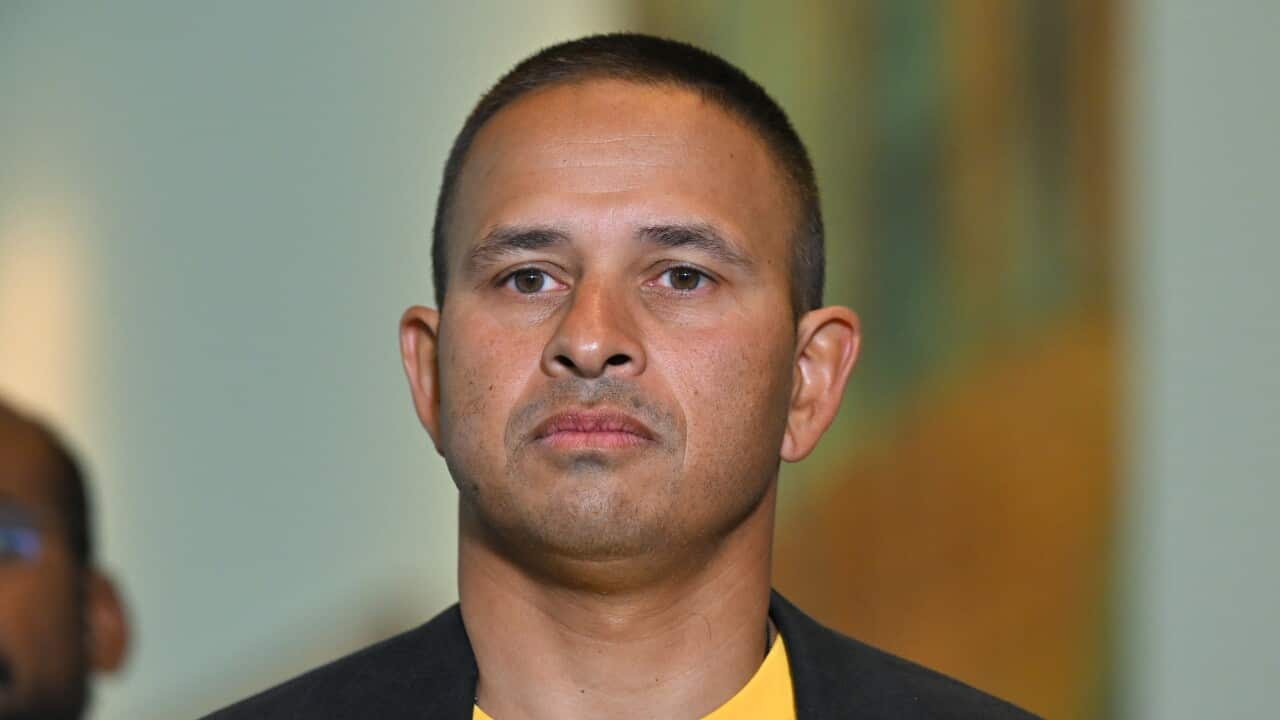Australian cricketer Usman Khawaja said sporting bodies should consider banning Israel from world competitions, accusing it of breaching international law in the killing and starvation of Palestinians in Gaza.
"No country that doesn't follow international law or humanitarian law, is committing war crimes, [should] just seriously be looked at in their position and their privilege around the world," he told SBS News.
When asked whether Australia should allow Israel to be represented at the 2032 Olympics in Brisbane, he said: "It's a long way away."
"I’m hoping I'm still not talking this in 2032 … If this is still going on in 2032, God help us," he said.
But the International Olympic Committee has all but ruled out the suggestion, with a spokesperson telling SBS News both the teams of Israel and the Palestinian territories are recognised and "have equal rights".
"Teams from both participated in the Olympic Games Paris 2024 and their athletes were living peacefully together under one roof in the Olympic Village," a spokesperson said.
The opening batsman had a private meeting with Prime Minister Anthony Albanese in Canberra, urging him to end all trade with Israel and to impose strict sanctions until, he said, "aid flows back into Gaza and they stop killing innocent children".
While Khawaja said he wanted to keep the details of the conversation private, he said they "had a great to-and-fro" of ideas.
Khawaja praised the Australian government's plan, announced this month, to recognise Palestinian statehood, and his response to Israeli Prime Minister Benjamin Netanyahu, who called Albanese a "weak politician".
But he said he believes "there's more courage to be had" in imposing targeted sanctions on Netanyahu, who was issued an arrest warrant by the International Criminal Court last year over alleged war crimes of starvation and crimes against humanity. Netanyahu denies the allegations.
Treasurer Jim Chalmers, who was also present at the meeting, told reporters on Wednesday he respected Khawaja as a leader.
"The best way to understand Usman Khawaja is that he is a great cricketer, but that's not his best quality. He's a wonderful humanitarian and a very fine Australian," Chalmers said.
Khawaja has publicly advocated for the rights of Palestinians both online and on the pitch, since Israel's military bombardment started more than two years ago.
The International Cricket Council (ICC) prevented the cricketer from wearing shoes at a Test match in December 2023, which had text that read: "All lives are equal" and "freedom is a human right". He was charged by the ICC for wearing a black armband in support of people in Gaza, then blocked by the council again from displaying a dove sticker on his bat ahead of the Boxing Day Test match.
Khawaja said the reason he started speaking out in support of Palestinians was because of how affected he felt, as a father of two girls.
"I remember just seeing these young Palestinian kids wrapped in white sheets and mothers and fathers crying over their bodies," he said.
"It still gets me emotional, because I think, what if that was my daughter? What if that's my Aisha, my island I was carrying to the graveyard?
"It's hard enough, losing a kid. It's hard, even harder, losing them to starvation. So when I see that breaks my heart."
The United Nations-backed Integrated Food Security Phase Classification (IPC) has warned a "worst-case famine scenario" is unfolding for some of Gaza's population of 2.1 million.
Earlier this month, the IPC determined that famine was occurring in Gaza City and was likely to spread to other parts of Gaza. The group said 514,000 people are experiencing famine, with the number expected to rise to 641,000 by the end of September.
Israel describes widespread hunger documented by aid agencies as "a Hamas-orchestrated starvation campaign", with Netanyahu stating: "There is no policy of starvation in Gaza, and there is no starvation in Gaza."
In a statement to SBS News earlier this month, a spokesperson for the Israel Defense Forces (IDF) said: "The IDF forcefully rejects the allegation of deliberate starvation of the civilian population."
Khawaja said the situation in Gaza shouldn't be considered a political issue, but rather a human rights one.
"People have enough footage, they have enough documentation, enough objective data.
"It's sad to think [we are] in a world that doesn't have an effect on everyone, but it's happening."
SBS News has contacted the Israeli embassy for comment.
For the latest from SBS News, download our app and subscribe to our newsletter.

